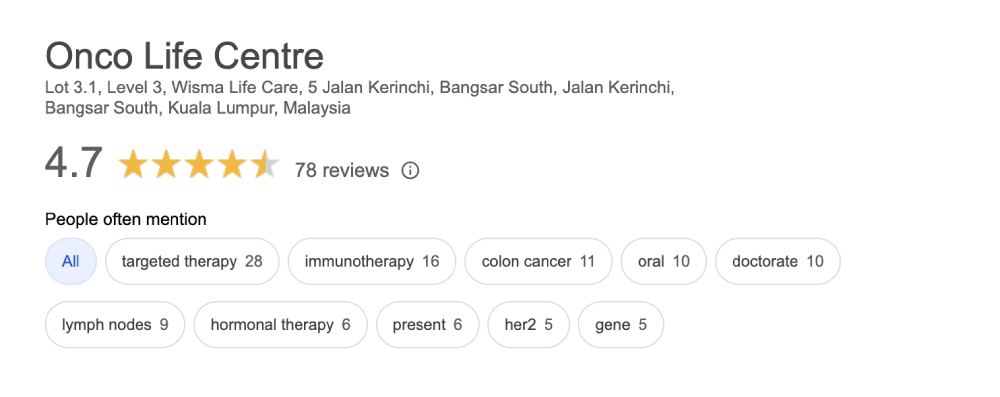






Onco Life Center Media Article 1
Never-smokers still at risk
By SRIMAYEE SEN SARMA
LUNG cancer is a diagnosis that most people dread, and there is a valid reason for this fear. According to World Health Organization (WHO), cancer accounted for 9.6 million deaths worldwide last year, 1.76 million of which were caused by lung cancer.
Datin Paduka Prof Dr Teo Soo Hwang, chief executive of Cancer Research Malaysia and cancer researcher/geneticist, says, “Eighty-six per cent to 92% of male lung cancer patients and 60% to 70% of female lung cancer patients are smokers, suggesting that smoking is still the most significant risk factor for lung cancer in Malaysia.
“Lung cancer is the second most common type of cancer among Malaysian men, fifth most common among Malaysian women, and third most common overall. One in 10 cancer patients is diagnosed with lung cancer, and smokers across all ethnicities, genders and age groups are more likely to get lung cancer.”
While it is true that smoking is one of the biggest risk factors for lung cancer, nonsmokers can be in danger, too.
According to a 2009 article titled Lung cancer in never smokers: Clinical epidemiology and environmental risk factors published in Clinical Cancer Research, never-smokers account for approximately 10% to 15% of lung cancer cases in the United States.
Even though there is no data-based evidence of the number of lung cancer cases in never-smokers in Malaysia, Dr Christina Ng Van Tze, consultant medical oncologist and the president and founder of Empowered – a non-governmental organization that focuses on aiding the underprivileged section of the society in Malaysia with cancer treatment – says, “The number of non-smokers developing lung cancer are growing and becoming a concern. It is estimated that around 15% to 20% of men and about half the women diagnosed with lung cancer never smoked.”
So then, what causes lung cancer in never smokers?
Finding answers
When a non-smoker develops lung cancer, it can be attributed to more than one factor, including environmental, occupational or genetic.
In an article published in Science Blog by Cancer Research UK titled Science Surgery: ‘Why do never-smokers get lung cancer?’, Dr Mariam Jamal-Hanjani, oncologist and clinical researcher specializing in lung cancer at University College London, mentions that non-smokers who develop lung cancer are more likely to have cells with a gene abnormality called EGFR.
“If you have never smoked, you are more likely to develop lung cancer that is driven by a fault in one or more genes. These are not necessarily genetic faults that you are born with, they may be faults that develop during the lifetime,” wrote Dr Mariam.
Environmental and occupational factors, on the other hand, include exposure to radon, passive smoking, aerosolized oils caused by wok cooking, and asbestos exposure. The article also elaborated that there is a marked difference in the kind of lung cancer common in smokers and non-smokers.
According to Dr Ng, lung cancer can be generally divided into two groups – small cell lung cancer (SCLC) and non-small cell lung cancer (NSCLC). NSCLC is further divided into three types – adenocarcinoma, squamous cell carcinoma and large cell carcinoma.
SCLC is the most aggressive kind of lung cancer and is thankfully less common and almost rare in non-smokers. Other less common types of lung cancer are lung carcinoid and pulmonary lymphoma. While smokers can develop all kinds of lung cancers, non-smokers are more prone to developing adenocarcinoma.
Till now, lung cancer in smokers and nonsmokers have been treated in a similar manner. However, this may change with new research bringing to light more differences in the characteristics of lung cancer in smokers and non-smokers.
Lifestyle matters
Even though never-smokers can get lung cancer, the good news is that such patients respond better to chemotherapy than smokers, according to a 2006 study titled Smoking affects treatment outcome in patients with advanced nonsmall cell lung cancer, published in Cancer.
Dr Ng has a similar opinion, saying, “A healthy lifestyle before the diagnosis of lung cancer is one of the deciding factors of how well someone will respond to treatment.”
She nmes a patient, Sim Siew Bee, as an example. Sim, who was diagnosed with stage four lung cancer that had metastasized to her throat and brain in May last year, responded so well to treatment that she is already in remission.
Dr Ng attributes Sim’s fast recovery to her excellent health before her diagnosis. She says, “Sim led a healthy lifestyle. This helped her respond to the treatment better than people who have health issues prior to diagnosis.”
Prof Teo raises concern that most new treatment costs for cancer far exceed the average income of many individuals lying even in high-income countries, and the same could be said of Malaysia as cancer treatment is not affordable to most people here, even to those who are insured or live on an upper-middle income.
“However, the Government is doing all the right things to reduce the burden of lung cancer on the Malaysian public by increasing tobacco taxes, tightening regulations for tobacco advertisement and promotion, and increasing the coverage of smoking bans in public places,” she adds.
Nevertheless, the fact remains that nothing will work unless there is awareness among people and they consciously choose what is best for themselves as well as others. While quitting smoking is the first step towards reducing the high incidence rate of lung cancer worldwide, the next step would be understanding and avoiding environmental hazards.
Being diagnosed with lung cancer caused by genetic factors is not in our hands, but we can at least work on reducing modifiable external risk factors such as lifestyle and the environments we choose to expose ourselves to.

